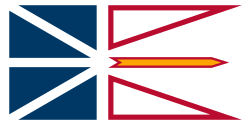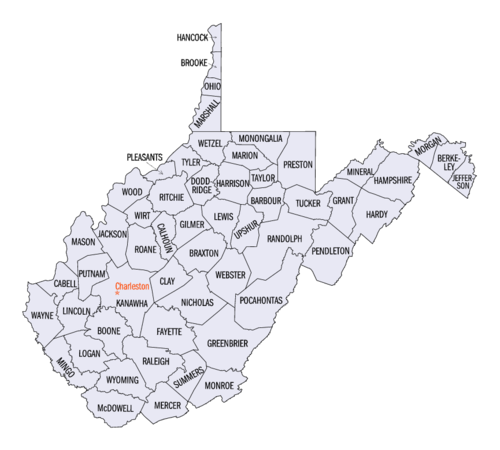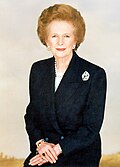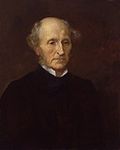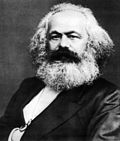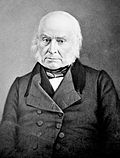Portal:Politics
| Main | Topics and categories | Tasks and projects |
The Politics portal

Politics (from Ancient Greek πολιτικά (politiká) 'affairs of the cities') is the set of activities that are associated with making decisions in groups, or other forms of power relations among individuals, such as the distribution of status or resources. The branch of social science that studies politics and government is referred to as political science.
Politics may be used positively in the context of a "political solution" which is compromising and non-violent, or descriptively as "the art or science of government", but the word often also carries a negative connotation. The concept has been defined in various ways, and different approaches have fundamentally differing views on whether it should be used extensively or in a limited way, empirically or normatively, and on whether conflict or co-operation is more essential to it.
A variety of methods are deployed in politics, which include promoting one's own political views among people, negotiation with other political subjects, making laws, and exercising internal and external force, including warfare against adversaries. Politics is exercised on a wide range of social levels, from clans and tribes of traditional societies, through modern local governments, companies and institutions up to sovereign states, to the international level.
In modern states, people often form political parties to represent their ideas. Members of a party often agree to take the same position on many issues and agree to support the same changes to law and the same leaders. An election is usually a competition between different parties.
A political system is a framework which defines acceptable political methods within a society. The history of political thought can be traced back to early antiquity, with seminal works such as Plato's Republic, Aristotle's Politics, Confucius's political manuscripts and Chanakya's Arthashastra. (Full article...)
Selected article

Regulamentul Organic (Romanian: [reɡulaˈmentul orˈɡanik], English: Organic Regulation; French: Règlement Organique; Russian: Органический регламент, romanized: Organichesky reglament) was a quasi-constitutional organic law enforced in 1831–1832 by the Imperial Russian authorities in Moldavia and Wallachia (the two Danubian Principalities that were to become the basis of the modern Romanian state). The document partially confirmed the traditional government, including rule by the hospodars, and set up a common Russian protectorate which lasted until 1854. The Regulament itself remained in force until 1858. Conservative in its scope, it also engendered a period of unprecedented reforms which provided a setting for the Westernization of the local society. The Regulament offered the two Principalities their first common system of government.
Featured picture

Annkathrin Kammeyer (born 1990) is a German Social Democratic politician. She became a Member of the Hamburg Parliament on 7 March 2011, the youngest person ever elected to that body.
Selected quote
Selected biography
Ed Stelmach (born 1951) was the Premier of Alberta, Canada, from December 14, 2006 to October 7, 2011. He spent his entire pre-political adult life as a farmer, except for some time spent studying at the University of Alberta. His first foray into politics was a 1986 municipal election, when he was elected to the county council of Lamont County. A year into his term, he was appointed reeve. He continued in this position until his entry into provincial politics. In the 1993 provincial election, Stelmach was elected as the Member of the Legislative Assembly for Vegreville-Viking. A Progressive Conservative, he served in the cabinets of Ralph Klein. When Klein resigned the party's leadership in 2006, Stelmach was among the first to run to replace him. After a third place finish on the first ballot of the leadership race, he won an upset second ballot victory over former provincial treasurer Jim Dinning. Stelmach's premiership has been heavily focused on management of the province's oil reserves, especially those of the Athabasca Oil Sands. Other policy initiatives have included commencing an overhaul of the province's health governance system, a re-introduction of all-party committees to the Legislature, and the conclusion of a major labour agreement with Alberta's teachers.
Did you know (auto-generated) -

- ... that Nirmalendu Goon shared his doubts about Sheikh Mujibur Rahman's political decisions during the 1969 East Pakistan mass uprising in his poem Huliya?
- ... that valence populism cannot be positioned on the left–right political spectrum?
- ... that Philipp Tanzer has been an army medic, artist, firefighter, hairdresser, massage therapist, festival organiser, political candidate and gay porn star?
- ... the 2025 student elections at 15 constituent campuses of Tribhuvan University could not be held due to political conflicts between student organizations?
- ... that although Uzun-Hajji and Najmuddin of Gotzo were originally political allies, they later fought on opposing sides of the Russian Civil War?
- ... that Satrio Sastrodiredjo and Moerachman, both former mayors of Surabaya, Indonesia, were held as political prisoners in the same prison after the 30 September Movement in 1965?
More did you know...
- ...that the Almanach de Gotha is a directory of European nobility first published in 1763?
- ...that "Tippecanoe and Tyler too" (campaign banner pictured) was called the "Marseillaise" of the 1840 United States presidential election?
- ...that the events of Polish October together with Hungarian November shook the Eastern Bloc in 1956 and set the course for the Revolutions of 1989?
- ...that the current constitution of Nicaragua, the ninth in the country's history, was the final step in the institutionalization of the Sandinista regime?
- ...that Chinese Taipei is the designated name the Republic of China (Taiwan) uses in most international organizations?
- ...that the controversial Iraq De-Ba'athification policy banned anyone affiliated with the Ba'ath Party from working in the public sector?
In this month
- June 28, 2004 - Canadian federal elections occur; the Liberal party loses its absolute majority.
News and Current events
- August 11: 4 local government areas in New South Wales, Australia locked down after COVID-19 case
- August 11: Australia: AstraZeneca vaccine access expanded by Victorian government
- August 1: Australia: Victorian lockdown lifted
- July 29: Tunisia's president dismisses prime minister, suspends parliament
- July 25: Australia: Wikinews interviews Reg Kidd, mayor of the City of Orange, about COVID-19 lockdown and local government
- July 23: South Australia enters week-long lockdown to contain COVID-19 Delta variant spread
- July 21: Technological University Dublin senior lecturer Dr Lorcan Sirr speaks to Wikinews on housing market in Ireland
- July 21: Three rural councils in New South Wales, Australia enter 7-day lockdown
- July 21: Australia: Victoria lockdown extended by a week with 85 active cases recorded
- July 15: California governor signs new state budget, eligible Californians to get stimulus payments
Topics and categories
General images
Related portals
Associated Wikimedia
The following Wikimedia Foundation sister projects provide more on this subject:
-
Commons
Free media repository -
Wikibooks
Free textbooks and manuals -
Wikidata
Free knowledge base -
Wikinews
Free-content news -
Wikiquote
Collection of quotations -
Wikisource
Free-content library -
Wikiversity
Free learning tools -
Wiktionary
Dictionary and thesaurus



